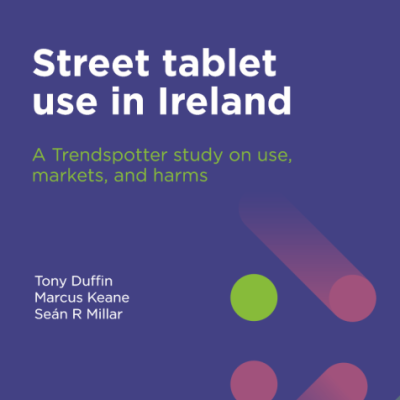Street tablet use in Ireland
The report, published by Ana Liffey Drug Project, at the end of April highlights the increase in use and availability of street tablets and an increase in the number of deaths and non-fatal overdoses involving benzodiazepines and other prescribable drugs in recent years in Ireland. It also notes changes in drugs markets, with purchasing online bringing significant regulatory challenges.
3 min read - 12 May 2020

‘Street tablet use in Ireland: A Trendspotter study on use, markets, and harms, is the result of a collaboration between Ana Liffey Drug Project, the School of Public Health at University College Cork (UCC), the Health Research Board (HRB) and the European Monitoring Centre for Drugs and Drug Addiction (EMCDDA)’, says Brian Galvin, a Senior Information Specialist at the HRB.
‘It utilised the EMCDDA’s Trendspotter methodology, drawing on the knowledge of an expert group to provide insights into the street tablet market in Ireland. The trendspotter method involves the rapid collection and triangulation of data from a variety of sources, incorporating multiple social research methods, and drawing on rapid assessment and response methods’.
‘The report highlights the increase in use and availability of street tablets and an increase in the number of deaths and non-fatal overdoses involving benzodiazepines and other prescribable drugs in recent years in Ireland. It also notes changes in drugs markets, with purchasing online bringing significant regulatory challenges’, he adds.
Street tablets are prescribable medications in tablet or capsule form which are not obtained from a medical professional and include benzodiazepines, z-drugs and gabapentinoids, three classes of drugs which are routinely used to treat conditions like insomnia, anxiety and neuropathic pain, but which also have a significant potential for misuse.
The report notes an increase in the number of non-fatal self-poisoning cases involving benzodiazepines and antiepileptic and sedative-hypnotic drugs between 2015 and 2018 as well as an overall increase in the number of deaths involving alprazolam, zopiclone, and pregabalin as being indicative of the potential serious adverse health consequences of misusing these drugs. It also outlines that the landscape of how people access the drug market is changing, with purchasing online bringing significant regulatory challenges. This landscape presents a number of challenges for policy-makers and practitioners seeking to reduce harms resulting from the street tablet market.
This was the first time that an NGO, an academic institution, a national drugs focal point and the EMCDDA collaborated on a study like this in Europe, and work like this may help better inform policy choices.
Paul Griffiths, EMCDDA Scientific Director added;
‘Trendspotter studies are very helpful. They can help us better understand a particularly challenging issue in a timely manner, such that policy makers can have good insights to help in formulating responses. On this occasion, we are very pleased that we were able to work with a civil society organisation and with the national focal point in Ireland to support them in this work – local insights are critical in solid policy formation, and many thanks to the Health Research Board and Ana Liffey Drug Project for bringing this work forward’.
Street tablet use in Ireland: A Trendspotter study on use, markets, and harms is available to download for free (15MB PDF).
3 min read - 12 May 2020



